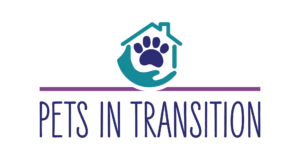
About the Program
Pets in Transition is a collaboration between the Guelph Humane Society (GHS), Guelph-Wellington Women in Crisis (WiC), Canadian Mental Health Association Waterloo Wellington (CMHA), and other local vet partners and animal welfare organizations. We support women who have animals and are experiencing violence by offering pet safety planning, resources and referrals and temporary emergency foster placement and care for the pets of women seeking shelter from domestic violence. All of our services are free of charge.
We have now expanded the Pets In Transition program for individuals who are hospitalized for mental health.
The Pets in Transition Program began in Spring 2018 as a partnership with the Guelph Humane Society, Guelph-Wellington Women in Crisis, and Community Veterinary Outreach. The program helps women and their pets flee domestic violence, together. Now this program is growing to support Canadian Mental Health Association Waterloo Wellington clients.
The Pets in Transition program supports not just women, but individuals experiencing significant mental health concerns by making sure that everyone in the home, both human and animal, has a safe place to recover. The Guelph Humane Society places pets with foster caregivers who have undergone specialized training. Thanks to the generosity of PetSmart Charities of Canada, the program will also provide everyday pet care items and services like high-quality pet food and veterinary care, if required.

How it Helps
Women who have pets and experience violence often have pets who experience violence, too. Domestic violence and animal abuse are so closely connected that psychologists and front-line workers in human and animal services see animal abuse as a predictor and indicator of other kinds of violence in the home. Abusers target animals to coerce their partners into doing what the abuser wants, to control, intimidate or punish family members and to stop family members from speaking out about the abuse and getting help.
For individuals requiring or seeking hospitalization to receive care for mental health, finding a safe place for pets to go can be difficult. Many individuals in need of hospitalization postpone or avoid going because they can’t leave their pets or don’t have a trusted temporary home for them.
Both of these cases demonstrate barriers for individuals seeking help. Most domestic violence shelters can’t accommodate pets and many women who experience abuse are isolated from family and friends. Similarly, individuals in need of mental health support are prohibited from bringing pets into the facilities with them. Pets in Transition offers extended, confidential foster care for pets so individuals can transition to violence-free, healthy lives.
Who is eligible for the program?
Anyone who is, or knows someone who is, experiencing violence or mental health struggles, is welcome to the information and general resources we provide. To access foster-based care for pet(s), individuals must be residents of Marianne’s Place or clients of the Canadian Mental Health Association Waterloo Wellington who are hospitalized for mental health or addiction.
What if someone needs help but isn’t ready to leave their abuser yet?
Pets in Transition offers resources and support around pet safety planning, finding options for pet care, leaving pets with friends or family members, preventative health care for pets and more.
How does someone get their pet into foster care?
Women who are or will be residents of Marianne’s Place can access the program through Marianne’s Place staff. Similarly, clients of the Canadian Mental Health Association (CMHA) Waterloo-Wellington can access the program through CMHA staff. Staff will help clients complete the intake forms and liaise with the Guelph Humane Society, which finds the best possible foster match for the animal(s) from a pool of caregivers with specialized training in caring for animals who may have experienced or witnessed violence.
For safety and confidentiality reasons, all information about clients is kept with Women in Crisis or CMHA and there is no direct contact between clients and the Guelph Humane Society. Foster caregivers also remain anonymous.
Do pets have to be up to date on their shots?
No. GHS will arrange for an exam by a local vet who will provide necessary preventative care, including shots, when a pet comes into the program.
How long can pets stay in foster care?
Foster care can be provided for up to 12 weeks.
Can someone visit their pet(s)?
Unfortunately, due to safety concerns for the pets and their owners, in-person visitations are not permitted. Our staff are happy to provide regular updates to the owner through the partner agency.
What happens at the end of the foster period?
When a client leaves the program, Marianne’s Place staff or CMHA staff liaise with the Guelph Humane Society, which coordinates with foster caregivers to return pets within 48 hours so they can be reunited with their owners.
If You Need Support
Individuals who would like more information or who wish to access the program through Women in Crisis can call the Guelph-Wellington Women in Crisis 24-Hour Crisis Line: 519-836-5710 or 1-800-265-7233.
Individuals looking to learn more or access the program through CMHA can call the Canadian Mental Health Association Waterloo Wellington 24-Hour Crisis Line: 1-844-437-3247 or 1-877-688-5501.
Ways to Help
Foster an Animal
If you think you could open your home to a pet for 10-12 weeks, please contact the Guelph Humane Society. You’ll be asked to attend special training on caring for animals who may have come out of violent homes. Ongoing support and supplies are provided. Contact foster@guelphhumane.ca for more information.




